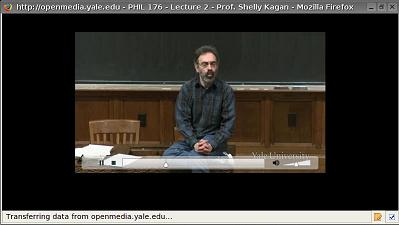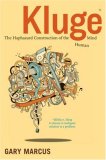April 20, 2008
Open Yale Courses has video lectures posted for seven introductory courses, including a philosophy course on Death given by Prof. Shelly Kagan (shown below) and “Introduction to Psychology” with Prof. Paul Bloom.

Comments (2)
- philosophy of mind,self
I’m not sure how I missed posting about Kluge: The Haphazard Construction of the Human Mind by Gary Marcus before this, but there’s probably a good explanation in the book!

Product description:
Are we noble in reason? Perfect, in God’s image? Far from it, says New York University psychologist Gary Marcus. In this lucid and revealing book, Marcus argues that the mind is not an elegantly designed organ but rather a “kluge,” a clumsy, cobbled-together contraption. He unveils a fundamentally new way of looking at the human mind — think duct tape, not supercomputer — that sheds light on some of the most mysterious aspects of human nature.
Taking us on a tour of the fundamental areas of human experience — memory, belief, decision-making, language, and happiness — Marcus reveals the myriad ways our minds fall short. He examines why people often vote against their own interests, why money can’t buy happiness, why leaders often stick to bad decisions, and why a sentence like “people people left left” ties us in knots even though it’s only four words long.
Marcus also offers surprisingly effective ways to outwit our inner kluge, for the betterment of ourselves and society. Throughout, he shows how only evolution — haphazard and undirected — could have produced the minds we humans have, while making a brilliant case for the power and usefulness of imperfection.
Marcus was on bloggingheads.tv with Carl Zimmer last week.
Comments (0)
- mind,new books
April 16, 2008
Ontology of Consciousness: Percipient Action (MIT Press) spent a long time as a “forthcoming” book but has finally made its own crucial ontological shift to “published.”
To me, the title doesn’t convey that the book is looking at consciousness from a wide range of disciplinary and cultural perspectives, which I think is needed to throw into perspective the assumptions made by one’s own culture and discipline. 
Here is the product description:
The “hard problem” of today’s consciousness studies is subjective experience: understanding why some brain processing is accompanied by an experienced inner life. Recent scientific advances offer insights for understanding the physiological and chemical phenomenology of consciousness. But by leaving aside the internal experiential nature of consciousness in favor of mapping neural activity, such science leaves many questions unanswered. In Ontology of Consciousness, scholars from a range of disciplines–from neurophysiology to parapsychology, from mathematics to anthropology and indigenous non-Western modes of thought–go beyond these limits of current neuroscience research to explore insights offered by other intellectual approaches to consciousness.
These scholars focus their attention on such philosophical approaches to consciousness as Tibetan Tantric Buddhism, North American Indian insights, pre-Columbian Mesoamerican civilization, and the Byzantine Empire. Some draw on artifacts and ethnographic data to make their point. Others translate cultural concepts of consciousness into modern scientific language using models and mathematical mappings. Many consider individual experiences of sentience and existence, as seen in African communalism, Hindi psychology, Zen Buddhism, Indian vibhuti phenomena, existentialism, philosophical realism, and modern psychiatry. Some reveal current views and conundrums in neurobiology to comprehend sentient intellection.
MIT Press’s site includes the Table of Contents plus full text of the Foreword by Robert Thurman, the Preface by Helmut Wautischer, and the Introduction by Stanley Krippner.
Comments (0)
- consciousness,culture,new books
While I was working on my taxes the last few days, there was a big “Seeds of Compassion” Conference in Seattle (April 11-15, 2008) which fortunately has a great webcast of the event, that I’ve just been watching. The Dalai Lama was there, and the opening session is a discussion of “The Scientific Basis for Compassion,” similar to the Mind and Life Institute events. The focus appears to be on compassion in child development.
There is an associated wiki with a reading list and some interesting mind-map style sketches from the conference.

Some of the participants also contributed to the 2001 book Visions of Compassion: Western Scientists and Tibetan Buddhists Examine Human Nature, one of the Mind and Life Institute books.
I also saw that the Dalai Lama is at the Mayo Clinic in Rochester, Minnesota, today (April 16) for Mind and Life XVI, Investigating the Mind-Body Connection: The Science and Clinical Applications of Meditation, which is also supposed to have a webcast, but I wasn’t able to connect to that one today.
Comments (0)
- cognitive science,meditation,mind

 The current issue of New Scientist has a feature on
The current issue of New Scientist has a feature on 




